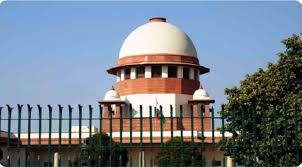The appellant was unsuccessful before the Gujarat High Court in his challenge to the orders passed by the authorities holding that the sale transaction in his favour was in breach of the provisions of the Gujarat Prevention of Fragmentation and Consolidation of Holdings Act, 1947 (Para 2)
Respondent Nos. 6 to 9 then filed Case No. PO/Fragmentation/SR/02/2010 in March, 2010, before the Prant Officer, Gandhinagar, challenging the sale transaction of the year 2007 in favour of the appellant, alleging that it was in violation of the provisions of the Act of 1947. By order dated 17.05.2012, the Prant Officer held the sale transaction to be illegal on the ground that it was in breach of Section 31(1) (b) of the Act of 1947. In consequence, he ordered cancellation of the appellant’s sale deed and payment of a fine of Rs. 250/- by him. He also directed initiation of proceedings to remove the appellant from the land. (Para 6)
The findings recorded by the High Court that there was no partition and that the land was never demarcated, whereby a portion thereof could have been sold to the appellant, do not take into account the fact that Respondent Nos. 6 to 9 themselves executed a sale agreement in the year 2014 and the contents thereof support the appellant’s claim that Respondent Nos. 10 to 19 were entitled to sell him their half-share. The issue as to whether the land sold to the appellant would constitute a ‘fragment’ in terms of Section 31(1)(b) read with Section 2(4) of the Act of 1947 and more so, in the context of whether the said land is irrigated land or dry land, has also not been examined extensively or in depth. (Para 15)
Reduction of the sale consideration in the appellant’s documents from 17,51,000/- to 1,07,000/- would have to be examined Rs. Rs. in the light of the appellant’s claim that his vendors wanted him to show a reduced sale consideration in the sale deed for the purpose of registration charges. The issue as to whether Respondent Nos. 6 to 9 were entitled to reopen the sale transaction of 2007 in the year 2010, despite the appellant’s claim that Prabhudasbhai knew of and approved the sale transaction, would also have to be examined as it is claimed by Respondent Nos. 6 to 9 that the sale agreement in which Prabhudasbhai was shown as a confirming party never saw the light of day earlier. All these aspects would require verification and adjudication upon evaluation of evidence. The parties would be in a position to adduce proper evidence in support of their respective cases only if they are given opportunity to do so before the original authority, viz., the Prant Officer, Gandhinagar. (Para 16)
Further, having purchased the land in the year 2007 after parting with valuable consideration, the appellant cannot be condemned without providing him a full opportunity to put forth his case with supporting evidence. Accordingly, we allow this appeal and set aside the orders passed by the Gujarat High Court as well as the orders passed by the authorities and remand the matter for consideration afresh on facts and law. (Para 17)
SUPREME COURT OF INDIA
2023 STPL(Web) 463 SC
[2023 INSC 1052]
KANAIYALAL MAFATLAL PATEL VS. STATE OF GUJARAT AND OTHERS
Civil Appeal No. 7963 of 2023 (@ Special Leave Petition (C) No. 6536 of 2022)-Decided on 6-12-2023
https://stpllaw.in/wp-content/uploads/2024/01/2023-STPLWeb-463-SC.pdf







